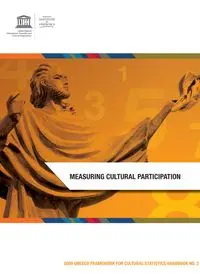
measuring-cultural-participation-2009-unesco-framework-for-cultural-statistics-handbook-2-2012-en PDF
Preview measuring-cultural-participation-2009-unesco-framework-for-cultural-statistics-handbook-2-2012-en
The UNESCO Institute for Statistics (UIS) is the statistical office of the United Nations Educational, Scientific and Cultural Organization (UNESCO) and is the UN depository for internationally comparable statistics in the fields of education, science and technology, culture and communication. While cultural practices are alive and ever-changing, models to gauge their impact must also evolve. But how can we measure cultural acts, such as partaking in a traditional ceremony, playing an instrument or visiting a museum virtually? In today’s world of technological advances, how does the Internet affect cultural practices? Do age and gender play a role in people’s level of cultural participation? Steering away from the traditional view of cultural practices, the UNESCO Institute for Statistics (UIS) is focusing on comprehensive definitions in order to develop new guidelines which can be applied by countries to measure cultural participation. To this end, the UIS is producing a series of handbooks to expand on the concepts set forth in the 2009 UNESCO Framework for Cultural Statistics. This edition presents current trends in measuring cultural participation. By focusing mainly on quantitative approaches, it presents an overview of data collection instruments from around the world. The report also identifies best practices for countries to follow, as well as a checklist of critical topics for designing surveys. This handbook serves as an important resource for organizations interested in measuring cultural participation. 2009 UNESCO FramEwOrk FOr CUltUral StatiStiCS HaNdbOOk NO. 2 mEaSUriNG CUltUral PartiCiPatiON 2009 FRAMEWORK FOR CULTURAL STATISTICS HANDBOOK NO. 2 Measuring cultural participation UNESCO The constitution of the United Nations Educational, Scientific and Cultural Organization (UNESCO) was adopted by 20 countries at the London Conference in November 1945 and entered into effect on 4 November 1946. The Organization currently has 195 Member States and 8 Associate Members. The main objective of UNESCO is to contribute to peace and security in the world by promoting collaboration among nations through education, science, culture and communication in order to foster universal respect for justice, the rule of law, and the human rights and fundamental freedoms that are affirmed for the peoples of the world, without distinction of race, sex, language or religion, by the Charter of the United Nations. To fulfil its mandate, UNESCO performs five principal functions: 1) prospective studies on education, science, culture and communication for tomorrow's world; 2) the advancement, transfer and sharing of knowledge through research, training and teaching activities; 3) standard-setting actions for the preparation and adoption of internal instruments and statutory recommendations; 4) expertise through technical co-operation to Member States for their development policies and projects; and 5) the exchange of specialized information. UNESCO is headquartered in Paris, France. UNESCO Institute for Statistics The UNESCO Institute for Statistics (UIS) is the statistical office of UNESCO and is the UN depository for global statistics in the fields of education, science and technology, culture and communication. The UIS was established in 1999. It was created to improve UNESCO's statistical programme and to develop and deliver the timely, accurate and policy-relevant statistics needed in today’s increasingly complex and rapidly changing social, political and economic environments. The UIS is based in Montreal, Canada. Published in 2012 by: UNESCO Institute for Statistics P.O. Box 6128, Succursale Centre-Ville Montreal, Quebec H3C 3J7 Canada Tel: (1 514) 343-6880 Email:
